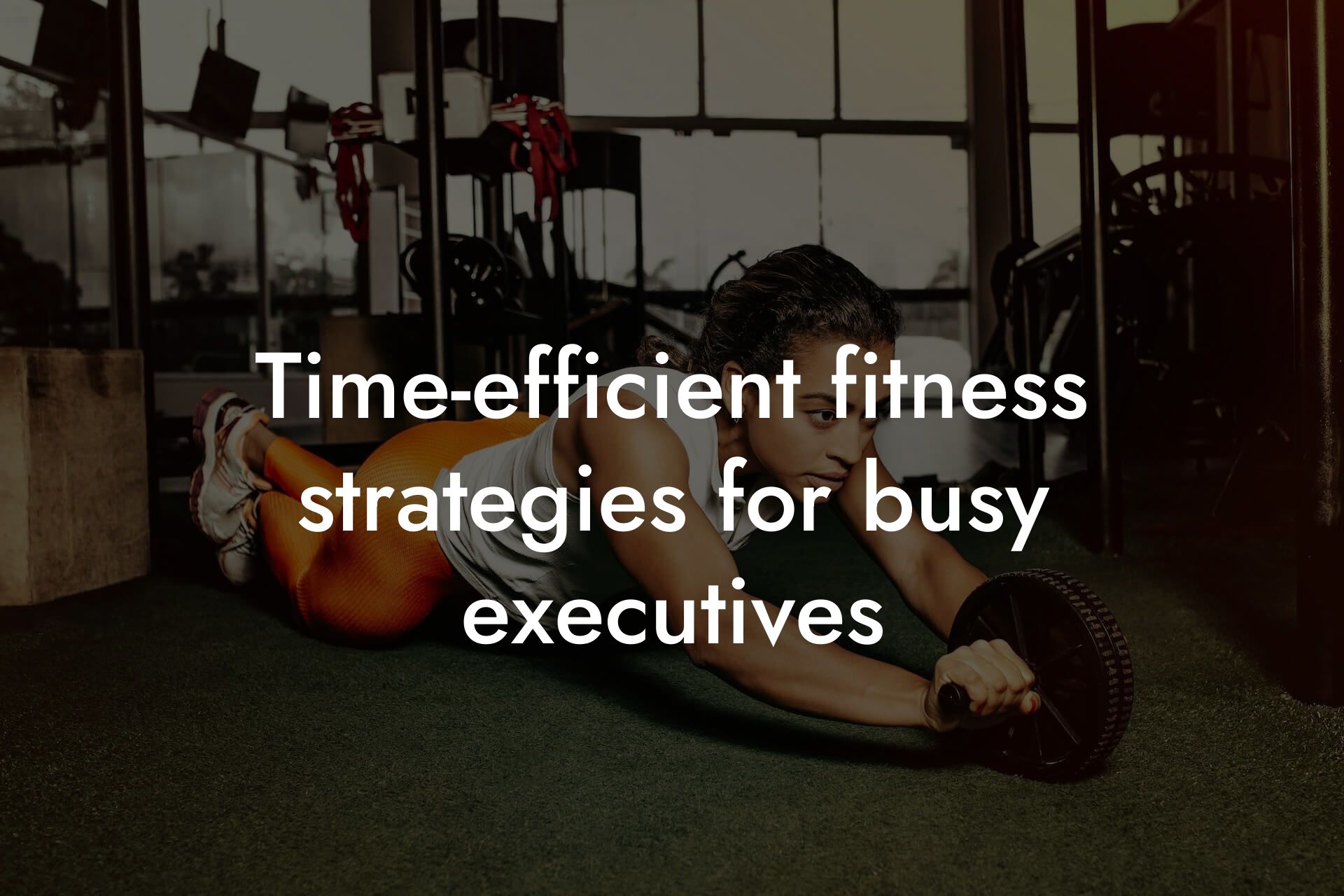As a high-earning professional, you understand the importance of performing at your best in the boardroom. Your physical appearance, body fat, physique, and bone density can all impact your confidence and ability to close deals. At Tano Performance Group, we believe that optimal nutrition is key to unlocking peak performance. In this article, we'll provide you with the nutrition tips you need to take your business to the next level.
Table of Contents
- Fueling Your Brain for Focus and Productivity
- Hydration for Mental Clarity and Alertness
- The Importance of Protein for Energy and Satiety
- Healthy Fats for Sustained Energy and Brain Function
- Complex Carbohydrates for Sustained Energy and Fiber
- Electrolytes for Hydration and Performance
- Avoiding Energy Crashes and Mood Swings
- Personalized Nutrition for Peak Performance
- Frequently Asked Questions
Fueling Your Brain for Focus and Productivity
When it comes to peak performance in the boardroom, your brain is your most valuable asset. To stay focused and productive, you need to fuel it with the right foods. Omega-3 fatty acids, found in fatty fish like salmon and sardines, are essential for brain function and development. Nuts and seeds, such as walnuts and chia seeds, are also rich in omega-3s and can be easily added to your diet. Additionally, complex carbohydrates like whole grains, fruits, and vegetables provide sustained energy and support cognitive function.
Hydration for Mental Clarity and Alertness
Dehydration can lead to mental fogginess, fatigue, and decreased productivity. As a high-earning professional, you can't afford to be anything less than sharp and alert in the boardroom. Aim to drink at least eight glasses of water per day, and avoid sugary drinks that can dehydrate you further. Consider incorporating hydrating foods like watermelon, cucumbers, and celery into your diet. And, if you're a coffee lover, be sure to balance your caffeine intake with plenty of water to avoid dehydration.
The Importance of Protein for Energy and Satiety
Protein is essential for energy production and satiety, making it a crucial component of a peak performance diet. Aim to consume 1.6-2.2 grams of protein per kilogram of body weight from sources like lean meats, fish, eggs, dairy, and plant-based options like legumes and tofu. Protein takes more energy to digest than carbohydrates, which can help increase your metabolism and support weight loss. Additionally, protein can help regulate blood sugar levels, reducing the risk of energy crashes and mood swings.
Healthy Fats for Sustained Energy and Brain Function
Healthy fats are often misunderstood, but they're essential for sustained energy and brain function. Avocados, nuts, and seeds are all rich in healthy fats that support hormone production, brain function, and can even help reduce inflammation. Look for sources of omega-6 fatty acids, like grapeseed oil and pumpkin seeds, which can help reduce inflammation and support heart health. And, don't be afraid to add a source of healthy fat to your meals, like olive oil or avocado oil, to support digestion and nutrient absorption.
Complex Carbohydrates for Sustained Energy and Fiber
Complex carbohydrates, like whole grains, fruits, and vegetables, provide sustained energy and fiber. Fiber is essential for digestive health, satiety, and can even help regulate blood sugar levels. Aim to consume a variety of colorful fruits and vegetables, like berries, leafy greens, and bell peppers, which are rich in antioxidants and fiber. Whole grains, like quinoa, brown rice, and whole wheat, provide sustained energy and support digestive health.
Electrolytes for Hydration and Performance
Electrolytes, like sodium, potassium, and magnesium, are essential for hydration and performance. They help regulate fluid balance, nerve function, and muscle contractions. As a high-earning professional, you need to be able to perform at your best, even under pressure. Look for sources of electrolytes like bananas, avocados, and coconut water, which can help replenish lost electrolytes and support hydration.
Avoiding Energy Crashes and Mood Swings
Energy crashes and mood swings can be devastating to your performance in the boardroom. To avoid them, focus on balanced meals that include a source of protein, healthy fat, and complex carbohydrates. Avoid sugary drinks and snacks that can cause blood sugar spikes and crashes. Instead, opt for nutrient-dense snacks like fruits, nuts, and seeds, which can provide a sustained energy boost. And, be sure to listen to your body and take breaks when needed, as fatigue can lead to decreased productivity and performance.
Personalized Nutrition for Peak Performance
At Tano Performance Group, we understand that every individual is unique, with different nutritional needs and goals. That's why we offer personalized body assessments using our state-of-the-art DEXA machine. Our team of experts will work with you to create a customized nutrition plan that takes into account your body composition, bone density, and physique goals. With our guidance, you'll be able to optimize your nutrition for peak performance in the boardroom and beyond.
Frequently Asked Questions
What is the importance of nutrition in achieving peak performance in the boardroom?
Nutrition plays a vital role in achieving peak performance in the boardroom. A well-nourished body and brain are essential for maintaining focus, energy, and mental clarity, allowing you to make informed decisions and stay ahead in the competitive business world. A balanced diet provides the necessary fuel for your brain and body to function optimally, enabling you to tackle challenges and achieve your goals.
How does nutrition impact my energy levels?
Nutrition has a direct impact on your energy levels. A diet rich in whole foods, fruits, and vegetables provides sustained energy, while a diet high in processed foods and sugar can lead to energy crashes and mood swings. Eating a balanced meal or snack every 3-4 hours can help maintain stable energy levels throughout the day.
What are the best foods for brain function and focus?
Foods rich in omega-3 fatty acids, such as salmon and walnuts, are excellent for brain function and focus. Other brain-boosting foods include berries, dark chocolate, and green tea, which are rich in antioxidants and flavonoids. Incorporating these foods into your diet can improve cognitive function, memory, and concentration.
How can I stay hydrated during long meetings and presentations?
Staying hydrated is crucial for maintaining focus and energy during long meetings and presentations. Aim to drink at least 8-10 glasses of water per day, and consider bringing a refillable water bottle to meetings. Avoid sugary drinks and caffeine, which can lead to dehydration. You can also consume hydrating foods like watermelon, cucumbers, and celery.
What are some healthy snack options for the office?
Healthy snack options for the office include nuts and seeds, dried fruits, energy bars, and jerky. You can also consider bringing fresh fruits, carrot sticks with hummus, or trail mix. Avoid sugary and processed snacks, which can lead to energy crashes and decreased productivity.
How can I manage stress and anxiety through nutrition?
Nutrition plays a significant role in managing stress and anxiety. Foods rich in complex carbohydrates, such as whole grains and fruits, can help regulate blood sugar levels and reduce stress. Omega-3 fatty acids, vitamin B, and magnesium can also help alleviate anxiety and promote relaxation. Avoid sugary and processed foods, which can exacerbate stress and anxiety.
What is the impact of caffeine on my performance?
Caffeine can have both positive and negative effects on performance. In moderation, caffeine can improve focus, energy, and mental clarity. However, excessive caffeine consumption can lead to jitters, anxiety, and decreased productivity. Be mindful of your caffeine intake and avoid consuming it in excess, especially in the afternoon.
How can I fuel my body for a high-intensity workout?
Fueling your body for a high-intensity workout requires a balanced meal or snack that includes complex carbohydrates, protein, and healthy fats. Aim to consume a meal or snack 1-2 hours before your workout, and consider foods like brown rice, quinoa, chicken, and avocado. Avoid sugary and processed foods, which can cause energy crashes during your workout.
What are some post-workout nutrition tips?
Post-workout nutrition is crucial for recovery and muscle growth. Aim to consume a meal or snack that includes protein and complex carbohydrates within 30-60 minutes after your workout. This can help promote muscle recovery, reduce soreness, and support muscle growth. Consider foods like bananas, protein shakes, and whole grain crackers with peanut butter.
How can I maintain a healthy weight while working in a high-stress job?
Maintaining a healthy weight while working in a high-stress job requires a combination of healthy eating habits and regular exercise. Aim to consume a balanced diet that includes whole foods, fruits, and vegetables, and avoid sugary and processed snacks. Regular exercise, such as walking or yoga, can also help reduce stress and promote weight loss.
What are some healthy meal options for busy professionals?
Healthy meal options for busy professionals include salads, soups, and stir-fries, which can be prepared quickly and easily. You can also consider meal prep, which involves preparing meals in advance and reheating them throughout the week. Aim to include a balance of protein, complex carbohydrates, and healthy fats in your meals.
How can I stay motivated to make healthy nutrition choices?
Staying motivated to make healthy nutrition choices requires setting clear goals and tracking your progress. Consider working with a registered dietitian or nutrition coach to develop a personalized nutrition plan. You can also find accountability and support through online communities or nutrition-focused groups.
What are some common nutrition mistakes that professionals make?
Common nutrition mistakes that professionals make include skipping meals, relying on coffee and energy drinks for energy, and consuming excessive amounts of sugar and processed foods. These mistakes can lead to energy crashes, decreased productivity, and poor overall health.
How can I prioritize nutrition in a busy schedule?
Prioritizing nutrition in a busy schedule requires planning and preparation. Consider meal prep, packing healthy snacks, and scheduling grocery shopping and meal planning into your calendar. You can also find healthy meal delivery services or nutrition-focused apps to support your nutrition goals.
What are some healthy breakfast options for busy professionals?
Healthy breakfast options for busy professionals include oatmeal with fruit and nuts, scrambled eggs with whole grain toast, and Greek yogurt with berries and honey. Aim to include a balance of protein, complex carbohydrates, and healthy fats in your breakfast to fuel your body for the day ahead.
How can I reduce bloating and digestive issues through nutrition?
Reducing bloating and digestive issues through nutrition requires identifying and avoiding trigger foods, such as gluten, dairy, and processed foods. Incorporating probiotics, fiber-rich foods, and healthy fats can also help promote digestive health and reduce bloating.
What are some healthy lunch options for the office?
Healthy lunch options for the office include salads, whole grain wraps with lean protein, and leftovers from last night's dinner. Aim to include a balance of protein, complex carbohydrates, and healthy fats in your lunch to fuel your body for the afternoon ahead.
How can I stay on track with my nutrition goals during travel?
Staying on track with your nutrition goals during travel requires planning and preparation. Consider packing healthy snacks, researching healthy restaurants and cafes, and scheduling grocery shopping and meal planning into your travel itinerary.
What are some healthy snack options for travel?
Healthy snack options for travel include nuts and seeds, dried fruits, energy bars, and jerky. You can also consider packing fresh fruits, carrot sticks with hummus, and trail mix. Avoid sugary and processed snacks, which can lead to energy crashes and decreased productivity.
How can I prioritize self-care through nutrition?
Prioritizing self-care through nutrition requires recognizing the importance of nutrition for overall health and well-being. Aim to consume a balanced diet that includes whole foods, fruits, and vegetables, and avoid sugary and processed foods. Prioritizing nutrition can help promote physical and mental well-being, leading to improved self-care and overall quality of life.
What are some common nutrition myths that professionals should be aware of?
Common nutrition myths that professionals should be aware of include the idea that low-fat or fat-free foods are healthy, that all carbohydrates are bad, and that dieting is the key to weight loss. These myths can lead to poor nutrition choices and decreased overall health. It's essential to stay informed and educated on the latest nutrition research and recommendations.
How can I get support for my nutrition goals?
Getting support for your nutrition goals requires finding a community or accountability partner. Consider working with a registered dietitian or nutrition coach, joining a nutrition-focused group or online community, or finding a workout buddy to support your nutrition goals.
Here are some related articles you might love...
- The importance of DEXA scans for business leaders
- Time-efficient fitness strategies for busy executives
- Strategies for building resilience in high-pressure roles
- The connection between physical fitness and leadership effectiveness
- Maintaining fitness during intense work travel
- The impact of body composition on executive presence
- How to integrate exercise into a packed executive schedule
- How physical fitness can boost executive decision-making
- How to manage stress and prevent burnout as a CEO
Zak Faulkner
Zak Faulkner is a leading authority in the realm of physical health and body composition analysis, with over 15 years of experience helping professionals optimise their fitness and well-being. As one the experts behind Tano Performance Group, Zak has dedicated his career to providing in-depth, science-backed insights that empower clients to elevate their physical performance and overall health.
With extensive knowledge of DEXA technology, Zak specializes in delivering comprehensive body assessments that offer precise data on body fat, muscle mass, bone density, and overall physique. His expertise enables individuals to make informed decisions and achieve their fitness goals with accuracy and confidence. Zak’s approach is rooted in a deep understanding of human physiology, combined with a passion for helping clients unlock their full potential through personalised strategies.
Over the years, Zak has earned a reputation for his commitment to excellence, precision, and client-focused service. His guidance is trusted by top professionals who demand the best when it comes to their health. Whether advising on fitness programs, nutritional strategies, or long-term wellness plans, Zak Faulkner’s insights are a valuable resource for anyone serious about taking their health and fitness to the next level.
At Tano Performance Group, Zak continues to lead our Content Team revolutionising how professionals approach their physical health, offering unparalleled expertise that drives real results.




